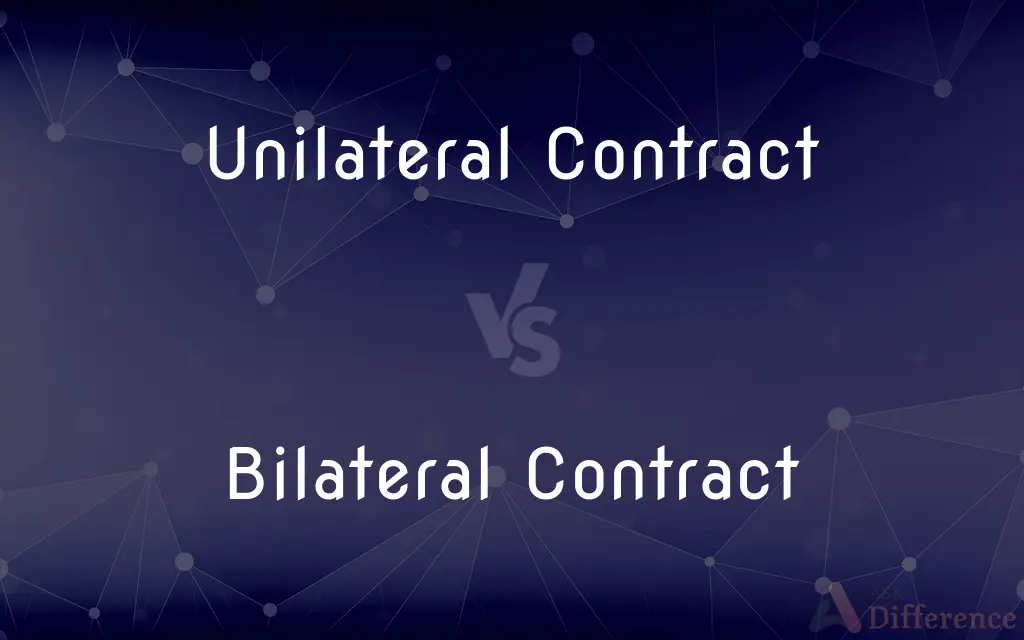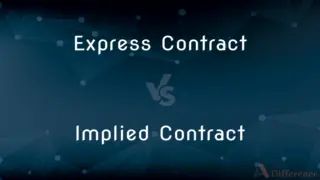Unilateral Contract vs. Bilateral Contract — What's the Difference?
By Tayyaba Rehman — Published on November 27, 2023
A Unilateral Contract involves one party's promise in exchange for another's act, while a Bilateral Contract involves mutual promises between two parties.

Difference Between Unilateral Contract and Bilateral Contract
Table of Contents
ADVERTISEMENT
Key Differences
Unilateral Contracts and Bilateral Contracts serve as fundamental constructs in contract law. A Unilateral Contract is characterized by a promise made by one party, which is fulfilled when the other party performs a specified act. For example, a reward offer is a form of Unilateral Contract: one person offers a reward, and the contract is completed once someone else performs the action to claim it.
Contrastingly, a Bilateral Contract involves a reciprocal arrangement where both parties make promises to each other. Most common contracts fall under the Bilateral Contract category. For instance, when one party promises to deliver goods and the other promises to pay for those goods, both are making binding promises, resulting in a Bililateral Contract.
It's crucial to discern between Unilateral Contracts and Bilateral Contracts when entering into an agreement. In a Unilateral Contract, the offering party is obligated once the action is performed by the accepting party. In Bilateral Contracts, both parties are bound by their promises from the onset of the agreement. This distinction dictates how and when the parties are obligated and the remedies available if a breach occurs.
In essence, while both Unilateral Contracts and Bilateral Contracts are binding, they differ in the number of promises made and the nature of the obligations. A Unilateral Contract revolves around a promise for an act, whereas a Bilateral Contract centers on mutual promises.
Comparison Chart
Number of Promises
One promise from one party.
Promises from both parties.
ADVERTISEMENT
Obligation Trigger
Upon performance of a specified act.
At the time of agreement.
Common Examples
Rewards, contests.
Sales contracts, service agreements.
Binding Nature
Binding for the offeror once the offeree performs.
Binding for both parties upon agreement.
Reliance
Offeree acts based on the offeror's promise.
Both parties rely on each other's promises.
Compare with Definitions
Unilateral Contract
A contract with a promise exchanged for a specific act.
Tom offered a $100 reward for his lost cat, forming a Unilateral Contract with the finder.
Bilateral Contract
A contract based on reciprocal commitments.
Hiring agreements, where one offers work and the other labor, are Bilateral Contracts.
Unilateral Contract
A one-sided promise contingent on performance.
The contest rules promised a prize for the first submission, creating a Unilateral Contract.
Bilateral Contract
A contract with mutual promises between two parties.
Jane agreed to sell her car, and Bob agreed to buy it, forming a Bilateral Contract.
Unilateral Contract
An agreement where only one party assumes an obligation.
Offering a bounty for information is a Unilateral Contract.
Bilateral Contract
An agreement where both parties have obligations.
A lease agreement, where one rents and the other provides the space, is a Bilateral Contract.
Unilateral Contract
An agreement with a promise awaiting fulfillment through action.
The lost dog poster offering a reward constituted a Unilateral Contract with potential finders.
Bilateral Contract
An agreement binding both parties upon acceptance.
Service contracts, detailing the scope and payment terms, are Bilateral Contracts.
Unilateral Contract
A contract binding the offeror once the offeree acts.
The promise of a bonus for reaching sales targets is a Unilateral Contract.
Bilateral Contract
A contract where both parties exchange promises.
Licensing agreements, granting rights in exchange for royalties, represent Bilateral Contracts.
Common Curiosities
When is a Unilateral Contract completed?
It's completed when the specified action is performed.
What is a Unilateral Contract?
A Unilateral Contract is where one party promises something in exchange for a specific action from another.
How do parties fulfill their obligations in a Bilateral Contract?
By performing the promises they made to each other.
How does a Bilateral Contract differ?
In a Bilateral Contract, both parties make promises to each other.
In which contract are both parties immediately bound?
In a Bilateral Contract, both parties are immediately bound.
Are most common contracts unilateral or bilateral?
Most common contracts are Bilateral Contracts.
What's a common example of a Unilateral Contract?
Offering a reward for a lost item.
Are verbal contracts Bilateral or Unilateral?
They can be either, depending on the promises made.
Can both types of contracts be in written form?
Yes, both can be written, although some may be verbal.
When is the offering party bound in a Unilateral Contract?
Once the other party performs the specified action.
Can a Unilateral Contract be revoked?
Generally, it can be revoked before the specified action is completed, unless otherwise stated.
Which contract is more common in everyday transactions?
The Bilateral Contract is more common in everyday transactions.
What happens if a party breaches a Bilateral Contract?
The non-breaching party may seek remedies like damages or specific performance.
Why is the distinction between the two important?
It dictates obligations, enforceability, and remedies.
Share Your Discovery

Previous Comparison
UN vs. UNO
Next Comparison
Express Contract vs. Implied ContractAuthor Spotlight
Written by
Tayyaba RehmanTayyaba Rehman is a distinguished writer, currently serving as a primary contributor to askdifference.com. As a researcher in semantics and etymology, Tayyaba's passion for the complexity of languages and their distinctions has found a perfect home on the platform. Tayyaba delves into the intricacies of language, distinguishing between commonly confused words and phrases, thereby providing clarity for readers worldwide.
















































